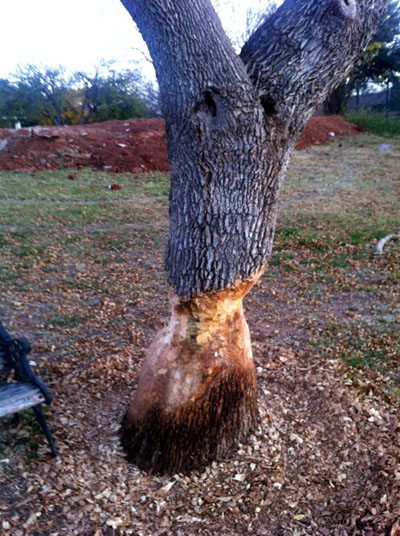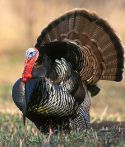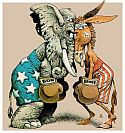Friday Bible Blogging - Exodus 1 to Exodus 10
This entry is part of a series. For a listing of all entries in the series, go to the Index. Unless otherwise noted, all Bible quotations are from the New Revised Standard Version (NRSV).
 With the first book of the Bible behind me, it's time to start on Exodus. The first ten chapters of this book introduce Moses and cover the beginning of the Passover story.
With the first book of the Bible behind me, it's time to start on Exodus. The first ten chapters of this book introduce Moses and cover the beginning of the Passover story.
I apologize for not posting an entry in this series last Friday, but with Thanksgiving and the short work week, I just didn't have time.
The book of Exodus started with a brief mention of Joseph, but quickly transitioned to the story that would be told in its pages. Joseph and all his brothers died, but their progeny were very successful, "But the Israelites were fruitful and prolific; they multiplied and grew exceedingly strong, so that the land was filled with them." A new Pharaoh came to rule Egypt, and he was not pleased with the Hebrews, "Look, the Israelite people are more numerous and more powerful than we. 10 Come, let us deal shrewdly with them, or they will increase and, in the event of war, join our enemies and fight against us and escape from the land." So, the Egyptians treated the Hebrews badly, forcing them to work hard labor.
The king of Egypt also tried to control the Hebrews in an even more brutal way - he commanded the Egyptian midwives to kill all male Hebrew babies, but allow the females to live. Luckily for the Israelites, the midwives disobeyed Pharaoh.
So, in the closing verse of this chapter, Pharaoh followed on with another dictate, "Every boy that is born to the Hebrews you shall throw into the Nile, but you shall let every girl live."
This chapter contained the famous story of Moses being hidden among the reeds of the Nile, in response to Pharaoh's command from the previous chapter. Moses was found by the daughter of Pharaoh, who took pity on him and raised him as her own. But for a princess, raising somebody as your own means hiring a nurse to take care of the job for you, and it just so happened that the nurse was Moses's biological mother. So, for the early years of his life, Moses was raised by his biological mother.
This chapter also included the story of Moses killing an Egyptian after seeing him beating a Hebrew, and Moses's subsequent fleeing from Egypt because of it. Along the way, he helped some girls who were being harassed by shepherds, allowing the girls to water their flocks. The daughters turned out to be those of the priest of Midian, and Moses ended up marrying one of them, Zipporah, and settling down in that region.
The final verses of this chapter caught my eye, "After a long time the king of Egypt died. The Israelites groaned under their slavery, and cried out. Out of the slavery their cry for help rose up to God. 24 God heard their groaning, and God remembered his covenant with Abraham, Isaac, and Jacob. 25 God looked upon the Israelites, and God took notice of them." These verses really make it sound like God had forgotten about the Israelites. It was only their 'groaning' that made him take notice and remember his covenant.
This was where God appeared to Moses in the burning bush, and told him to go back to Egypt to rescue the Israelites, promising that " I will bring you up out of the misery of Egypt, to the land of the Canaanites, the Hittites, the Amorites, the Perizzites, the Hivites, and the Jebusites, a land flowing with milk and honey." This is also where God got his Popeye moniker when Moses asked what he should call Him - "I am what I am", or more commonly translated as "I am who I am" or "I am who I will be". Though I suppose Exodus was written just a bit before Elzie Crisler Segar created Popeye.
Further preparing Moses to head back to Egypt, God told him what to say and miracles to perform to convince the Israelites that he really was being sent by God. The signs included turning his staff into a snake, putting his hand into his cloak and pulling it back out leprous (and vice versa to restore it), and pouring water from the Nile onto the ground and having it turn into blood. Honestly, if I were looking for evidence of the divine, I'd want to see 'miracles' a bit tougher than what I could see at magic show at a kids birthday party.
Being worried about his speaking skills, Moses convinced God to send Moses's brother, Aaron, to speak for him.
In verse 21, we get the first mention that God is going to be the one hardening Pharaoh's heart, so that he won't let the Israelites go. Granted, in other verses Pharaoh will 'harden his heart' on his own, but about half the time it's God perpetuating the situation and prolonging the Egyptians suffering.
Verses 24 through 26 are just weird - "24 On the way, at a place where they spent the night, the Lord met him and tried to kill him. 25 But Zipporah took a flint and cut off her son's foreskin, and touched Moses' feet with it, and said, 'Truly you are a bridegroom of blood to me!' 26 So he let him alone. It was then she said, 'A bridegroom of blood by circumcision.' " First, keep in mind that "Moses' feet" may be a euphemism for Moses' genitals. But the overall theme of the story is odd - why did God try to kill someone he just asked to perform a mission?
Moses and Aaron met with Pharaoh and began their 'negotiations' to free the Hebrews. In this chapter, there was no threat of miracles or plagues against the Egyptians, yet. It was just a request to let the Israelites have a few days off to go into the wilderness and pray to their god, lest He punish the Israelites. Pharaoh was angered by the request, and so he commanded the Israelites, who had already been making bricks for the Egyptians, to gather their own straw for the task, and to still complete the same quotas. This was obviously impossible, and the Israelites were punished accordingly.
God reassured Moses that He was going to free the Israelites, but when Moses relayed the message, the Israelites didn't believe him, given their conditions. Then followed a section on genealogy, and then God talking to Moses some more.
Moses and Aaron went to talk to Pharaoh, and the story finally got to the miracles and plagues that are so well known. First, Aaron threw down his staff and it became a snake. But Pharaoh's magicians were able to perform the same feat. I guess, just to show that the Israelites were still the heroes, Aaron's snake ate the magicians'.
Next, Aaron held his staff over the Nile and turned the water into blood, killing everything in it and making the river undrinkable. But Pharaoh's magicians were somehow able to replicate this feat, as well. I'm not really sure how, given that the entire river was already supposedly turned to blood.
But none of this changed Pharaoh's mind. His heart was still hardened.
This chapter continued on with more plagues. First came the frogs, which Pharaoh's magicians were also able to conjure. Then came gnats (lice in the KJV). This one was a trick Pharaoh's magicians weren't able to match, which caused them to claim that "This is the finger of God!" Because apparently, conjuring frogs is easy, but conjuring gnats is a miracle. Then came flies. These appeared to change Pharaoh's mind initially, but once the pests were gone, he once again refused to allow the Hebrews to leave.
The next plague afflicted the Egyptian's livestock, "all the livestock of the Egyptians died, but of the livestock of the Israelites not one died." Next came 'festering boils' on all of the people and animals. There's no mention made of the Israelites, but I think it's safe to assume that they were spared.
The plague after that had a few points worth calling out. This was a plague of "the heaviest hail to fall that has ever fallen in Egypt from the day it was founded until now." Any creature left out in the open would be killed. So, "Those officials of Pharaoh who feared the word of the Lord hurried their slaves and livestock off to a secure place," while the other officials left theirs in the open. When the hail struck, all of the slaves and livestock left in the open were killed, along with smashing all of the plants and shattering the trees. Pharaoh once again gave Moses permission to leave while the plague was still ongoing, but changed his mind once the hail and rain stopped.
The first point to question from that story is where the livestock came from, since they were supposedly killed a few verses before in this very same chapter. The other point is who was killed in this plague. It wasn't Pharaoh, his officials, or well to do Egyptians. It was their slaves. And it was a horrible death, being pelted to death by hail stones. If God actually existed, this would reveal a horrible cruelty on his part. As it is, it shows the mindset of the writers of Exodus - slaves were simply property, and their death was a punishment on their owners. (Not to mention the suffering of the livestock)
This chapter started with another explicit mention that God was hardening the heart of Pharaoh and his officials. So the reason that all these bad things were happening to the people of Egypt and their slaves had nothing to do with free will, as some apologists like to argue in regards to theodicy. In this case, it was basically God showing off, "that you may tell your children and grandchildren how I have made fools of the Egyptians and what signs I have done among them--so that you may know that I am the Lord."
This chapter continued on with the plague of locusts, and then a plague of darkness. But in both cases, the Lord had hardened Pharaoh's heart, and so he didn't let the Israelites leave.
---
The thing that stood out to me the most while reading these chapters was something I mentioned a few times above - the cruelty and callousness of God. He brought all these plagues that caused so much suffering - not just among Pharaoh and the rulers of Egypt, but amongst the people and even the slaves. And there's not even any good reason for why the suffering was so prolonged. When given the choice to let the Israelites go, which would presumably have stopped the plagues, God himself hardened Pharaoh's heart so that the suffering would continue. And even if the Egyptians were being punished because of how they treated the Israelites, what about all their other slaves? They weren't going to be a part of the Exodus like the Hebrews. They were still going to be stuck in Egypt once this story was over. Granted, I know that if there's any truth at all to this story, it's nowhere near as grandiose as the Biblical story (maybe just a small group who managed to escape), but taken at face value, it doesn't present a very flattering view of Yahweh.
New Revised Standard Version Bible, copyright 1989, Division of Christian Education of the National Council of the Churches of Christ in the United States of America. Used by permission. All rights reserved.





 Happy Thanksgiving a day early. Even as an atheist without any deities to give thanks to, I still think it's a good idea to stop and reflect on all the good fortune we've had, and take some time to appreciate it. Granted, there's no reason this should be limited to one day a year, but setting a day aside to force us to pause isn't such a bad thing.
Happy Thanksgiving a day early. Even as an atheist without any deities to give thanks to, I still think it's a good idea to stop and reflect on all the good fortune we've had, and take some time to appreciate it. Granted, there's no reason this should be limited to one day a year, but setting a day aside to force us to pause isn't such a bad thing. Way back in July of last year, I announced a
Way back in July of last year, I announced a  A while back, I wrote a blog entry,
A while back, I wrote a blog entry,  Once again, I got an e-mail forward that I couldn't help but respond to. This one simply copy-and-pasted an article from Conservative Daily,
Once again, I got an e-mail forward that I couldn't help but respond to. This one simply copy-and-pasted an article from Conservative Daily,  Well, it's been a week since election day. I meant to get to this post sooner, but real life got in the way.
Well, it's been a week since election day. I meant to get to this post sooner, but real life got in the way.
 Tomorrow is Election Day. Go vote and let your voice be heard. It's probably too late at this point to change many minds, but it's the obligation of bloggers to voice their opinions even when no one is interested.
Tomorrow is Election Day. Go vote and let your voice be heard. It's probably too late at this point to change many minds, but it's the obligation of bloggers to voice their opinions even when no one is interested. Another month down, another chance to look at the server logs. There were a couple surprises this time around. The blog entry,
Another month down, another chance to look at the server logs. There were a couple surprises this time around. The blog entry,